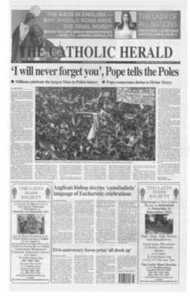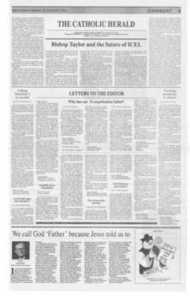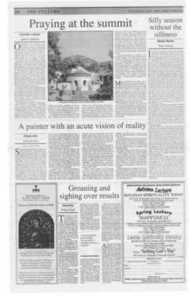Page 4, 23rd August 2002
Page 4

Report an error
Noticed an error on this page?If you've noticed an error in this article please click here to report it.
Tags
Share
Related articles
High Court Quashes Blasphemy Conviction
Pakistani Christian Sentenced To Life In Prison Under...
Why Did Bishop Joseph Die?
Asia
Pakistani Christian Freed From Jail
Christian on death row wins reprieve
BY SIMON CALDWELL
A PAKISTANI Christian who was sentenced to death on a trumped-up charge of blasphemy has been freed by the country's highest court. Ayub Masih, who is in his early 30s, has been in jail since October 1996 when he was falsely accused of blaspheming the Prophet Mohammed by one of his neighbours. He was sentenced to death in April 1998 but appealed against his conviction. On Thursday last week, the Supreme Court of Pakistan, silting in Islamabad, ordered his immediate release. The panel of judges concluded that "Ayub Masih is not found guilty of committing blasphemy, and allegations against Ayub are baseless and false". The decison was welcomed an by human rights groups which have been campaigning for his release. However, they warned that was Ayub's life w still in danger from Islamic fundamentalists in Pakistan who are persecuting the Christian minority there. Wilfred Wong, the research and parliamentary officer of the Jubilee Campaign, said: "We thank God for Ayub Masih's acquittal but at the same time we encourage others to pray very much for his safety as the extremists will try to harm him. "We should remember that there are still many Pakistani Christians imprisoned for blasphemy and two of them, Kingri Masih and Anwar Kenneth, are currently facing the death penalty." Stuart Windsor, national director of Christian Solidarity Worldwide (CSW), said: "We commend all those involved in taking this brave decision to free this high-profile prisoner who has done nothing wrong. "He has endured unimaginable suffering over the last six years and his life is still in very great danger from Islamic extremists. "We congratulate the Pakistani judiciary for seeing justice finally done. We hope this latest decision will set a precedent for all future blasphemy cases and bring a ray of hope to all those still imprisoned under this legislation." Ayub was charged under Section 295 of Pakistan's Penal Code which allows courts to punish those who "by words, either spoken or written, or by visible representations, or by any imputation, innuendo, or insinuation,directly or indirectly, defile the sacred name of the Holy Prophet". Ayub, who was 26 at the time of his arrest, said he was falsely accused by someone who wanted to steal his land. His story is supported by reliable local sources who say the accusations were fabricated in order to force 15 Christian families to drop a land dispute in Ayub's village of Arifabad. The case against him was registered without proper investigation and based solely on a statement made by the complainant Ayub later lost his land and the whole Christian population of the village was evicted. While inprison, Ayub was repeatedly threatened and attacked. He was even shot at by the complainant during a hearing in the Sahiwal sessions court, in the Punjab, in November 1997. According to CSW, Islamic fundamentalists also packed the courtrooms throughout the and hearings threatened to kill Ayub, his lawyers and the judges if he was not convicted and hanged. In April 1998, he was condemned to death by a judge of the Sahiwal district. The decision so outraged Catholic Bishop Dr John Joseph of Faisalabad, who had been campaigning against the blasphemy laws, that in protest he shot himself in the head on the steps of the Sahiwal courtroom. In the months prior to the trial, Bishop Joseph had grown deeply anxious because he could not find a lawyer who was willing to represent Ayub. In July last year, Ayub's first appeal was rejected by the Multan Bench of the Lahore High Court, so he took his case to the Supreme Court. Following release, human rights groups renewed their calls for the blasphemy laws to be repealed. In 2001 alone, it is estimated that at least 10 Christians, 40 Muslims, 23 Ahmadis and two Hindus have been charged under section 295. Last year, a doctor became the third Muslim to be sentenced to death for allegedly making blasphemous remarks about Mohammed. Also, at least five prisoners charged with blasphemy have been murdered and at least three others have been shot at by fundamentalists. A trial judge was murdered in 1997 after he acquitted two Christians accused of blasphemy.
blog comments powered by Disqus















